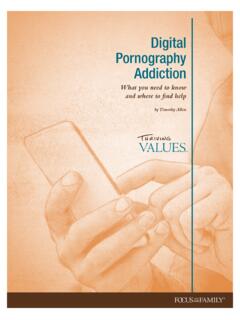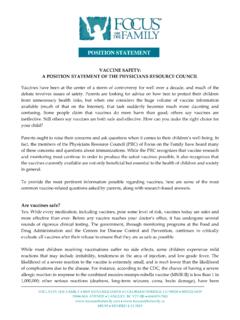Transcription of 2018 - Focus on the Family
1 ISTOCKPHOTO A PARENT S GUIDE TO today s technology2018 2018 Focus ON THE Family | ALL RIGHTS RESERVED THINKSTOCK introduction ..11: the brain & technology ..22: video games ..63: social media ..94: finding hidden apps ..135: cyberbullying ..17recommended resources ..21sources ..22everywhere I go, I see some kind of technology. It has transformed society, much like the printing press, radio or TV. However, what makes technology unique is that it s so intertwined in our lives that it s was supposed to make life easier.
2 More information at our fingertips. More shortcuts to simplify daily routines. But as parents, technology often makes our lives more difficult. Apps, video games and social media can become a time drain for our kids. They also create a direct and sometimes dangerous portal to our children. Instead of enhancing our kids lives, technology can isolate them and open them up to cyberbullying and risky goal of this resource is to encourage you to stop and think about the technology your Family uses. It will also help you understand and navigate the pitfalls of today s most popular digital platforms and games.
3 Technology will capture our children s attention. As parents, we need to educate and support them in developing healthy technology habits. God, through His Word, tells us to be attentive, be authentic and pursue unity with one another. That s great advice on how to live and how to act in our use of technology. A PARENT S GUIDE TO today s technologyintroductionc onte nt sBY DANIEL HUERTA, Focus ON THE Family VICE PRESIDENT OF PARENTING & YOUTH 2018 Focus ON THE FAMILY1my son was 11 when he first asked, Can I have a cellphone?
4 Then he quickly added, Most of the kids in my class have one. Statistics show the average age a child receives a smartphone is I knew my son was not yet ready for the onslaught of information and decisions that come with owning a mobile device most kids aren t. Convincing them of this fact can be a challenge, but it s a challenge worth online world seems to become more enticing every day. With more immersive gaming and new social media outlets, it s also more addictive. Fifty percent of teens surveyed by Common Sense Media in 2016 admitted to being addicted to their mobile As a counselor, I interact with parents who have questions about technology use for their kids.
5 Many wonder if it s OK to give a toddler a child -friendly tablet, or to allow their school-age children to have their own mobile phone. They ask if it s wise to allow their middle schooler to have a computer in the bedroom or sign up for social media technology certainly adds complications to the important job of raising kids. That s why it s important to approach technology use with intentionality and sensible limits, two of Focus on the Family s 7 Traits of Effective TOOL LIKE ANY OTHER?Technology by itself isn t good or evil.
6 It s a tool, just like fire or a power saw. Today s technology can enhance our lives or cause serious damage. In order to keep your children safe, it s important for parents to recognize how mobile devices can affect a child s is obvious that tech companies want to sell as many devices as possible. After all, it s business. Companies look for profits. They pay close attention to what gets buyers to continue picking up their products and the features that entice users. They most likely ask: How can we make our product best entertain, inform and inspire our buyers?
7 The result is that mobile devices are being increasingly engineered with an understanding of how human brains work especially when it comes to is a powerful neurotransmitter that helps us pay attention, be motivated and remember what we like or dislike. I believe it is no accident that tech companies design their products to increase the release of dopamine into the reward and pleasure pathways of our brains. The user feels rewarded by the interaction with the phone or other technology and wants to continue using it to always be looking for that next designed our brains to experience reward and pleasure.
8 But without limits and intentionality, the release of dopamine can cause unhealthy dependencies or addiction. It s sort of like having a wallet full of money. boys and girlsIn recent years, the Pew Research Center has revealed that boys are much more likely to talk with their friends while playing online video games than They also found that girls are more likely than boys to talk with their friends through social media channels or phone calls. A boy who feels inferior can control a powerful figure in an online world, while a girl who feels insecure believes she can find acceptance through social media.
9 59%Of TeEnS VIDEo CHAT WITH THEIR FrIEnDS. 72% Of TeEnS SpEnD TIMe WITH FrIEnDS VIASoCIAL MeDIA. 59%Of TeEnS VIDEo CHAT WITH THEIR FrIEnDS. 72% Of TeEnS SpEnD TIMe WITH FrIEnDS VIASoCIAL brain and technologyBY DANIEL HUERTA MSW, LCSW, LSSW, CCBT Focus ON THE Family VICE PRESIDENT OF PARENTING & YOUTHS ource: Pew Research Center Teens, Technology and Friendships 2018 Focus ON THE FAMILY2We may start the morning with lots of cash, but we spend it throughout the day. If we spend it too quickly or make poor decisions, there are consequences.
10 In the case of dopamine, these technology-triggered spikes could make us less attentive, motivated and emotionally stable. Other things can become boring and mundane. Regular life cannot compete with the thrill of social- and entertainment-related technology. Over time, people can get hooked on the stimuli that cause rushes of dopamine. And the flashy, glowing world available on every mobile device certainly creates enticing feelings of escape and excitement. Through widespread use of technology, our culture has been trained to behave differently than past generations: Attention spans are now much shorter than they once were, and many scan for information instead of reading it.
















